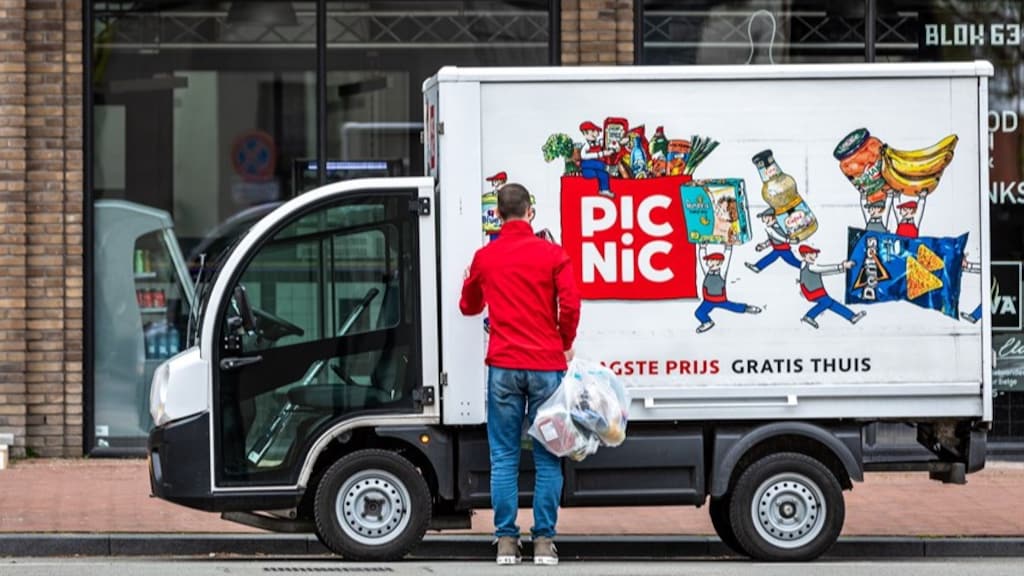Picnic does not have to adhere to the collective labor agreement for 'normal' supermarkets and shops, says the minister


Caretaker Minister Mariëlle Paul has decided to extend the exemption granted to online supermarkets such as Picnic, Crisp, and Flink. This means they will temporarily no longer be subject to the Food Industry Collective Labor Agreement (LMB), but can operate under their own terms and conditions (the e-commerce collective labor agreement). Picnic requested an exemption to do so.
The LMB collective labor agreement applies to employees working for franchisees, such as Plus and Spar, and to small independent businesses, such as cheese shops. Large supermarkets, such as Jumbo and Albert Heijn, are subject to a different collective labor agreement.
Discussion"The business model of online supermarkets is truly different from that of independent retailers or franchisees," says Paul. "At the same time, I want to appeal to all parties involved. The world is changing, and ordering and delivery are becoming increasingly normal. It would be good if they could come back to the table and find a solution that all parties can agree on."
The question of whether companies like Picnic should be covered by the collective bargaining agreement for small supermarkets and shops is the subject of an ongoing debate. Picnic calls itself a "supermarket on wheels" and, among other things, operates differently than a regular supermarket, lacking physical stores. Therefore, its employees are remunerated under a collective bargaining agreement for the e-commerce food sector, a collective bargaining agreement negotiated within the sector.
The unions FNV and CNV disagree, arguing that this collective bargaining agreement is less favorable for employees than the one for "regular" stores—for example, because employees under the second collective bargaining agreement receive allowances for weekend work. However, online supermarkets are also supermarkets and should therefore fall under the same collective bargaining agreement.
The union is therefore dissatisfied with the ministry's decision, calling it "a weak and incomprehensible choice." "Picnic is a supermarket, but the minister is allowing them to pretend otherwise for another year," says FNV board member Michiel Al.
He refers to a recent court ruling, which agrees with this - regarding a specific period of the collective labor agreement.
Several supermarkets and food manufacturers are using this sneaky trick: (text continues below the video).
The CNV trade union is also unhappy with the minister's decision and fears that major companies such as Jumbo and Albert Heijn will also want to place their online delivery services under a separate collective labor agreement.
"There's a danger that they, too, will apply for separate employment conditions for their online activities," says Jacqueline Twerda, negotiator at CNV. "Then support for the entire collective bargaining agreement will collapse, and the employment conditions for 350,000 supermarket employees will soon be highly uncertain." The union says it is considering further action against Paul's decision.
The Netherlands Authority for Consumers and Markets (ACM) wrote a letter to the minister about the matter this summer. The competition watchdog argued that Picnic's exemption should be extended, because without it, it would be difficult for the company to compete, which in turn would be detrimental to consumers—who would face higher grocery prices, the ACM argued.
The e-commerce collective bargaining agreement (CBA) offers companies like Picnic a slightly cheaper deal. They have a competitive advantage. If Picnic were to fall under the supermarket CBA, it would lead to higher wage costs, the organization says.
Online salesPaul also sees "strong" arguments for exemption. "Online supermarkets focus exclusively on online sales and deliver to homes without exception. The distribution structure they use for this is fully geared towards this," a statement reads. Their working methods are so different that the companies are allowed to use their own collective labor agreements for the time being, the minister added.
Former Minister Van Gennip previously declared the supermarket collective labor agreement (LMB) generally binding, meaning it applied to the entire sector, but made an exception for online supermarkets, hoping that the unions and companies would find a solution to the collective labor agreement issues themselves. So far, however, this has not been successful. Paul is now calling on them to meet again.
RTL Nieuws





